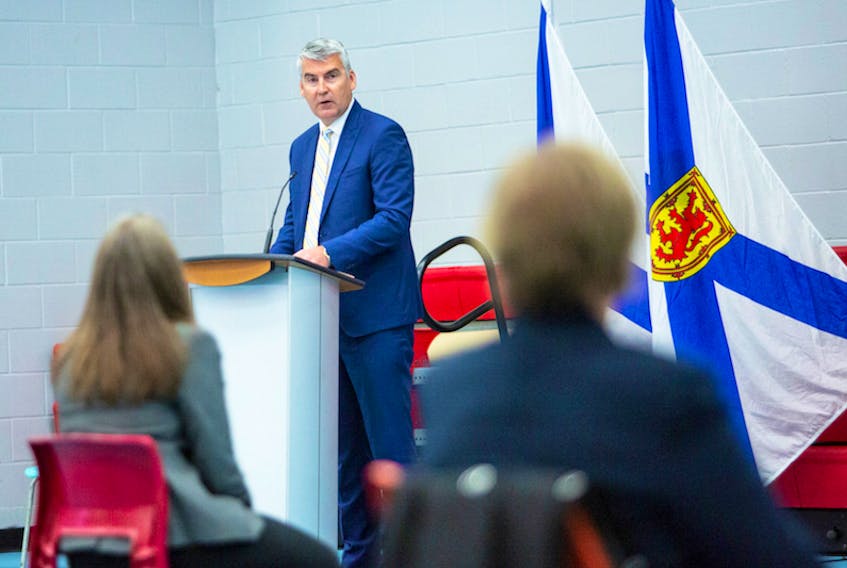Premier Stephen McNeil apologized Tuesday for the terrible stain of racial discrimination inflicted on African Nova Scotians by police and also for a Nova Scotia justice system plagued by institutional racism.
The apology comes 18 months after Scot Wortley’s March 2019 report finding Black people in Halifax were six times more likely to be stopped than white people. Last October, the province announced a province-wide ban on the practice.
“Black mothers have to tell their children: ‘Keep your hands out of your pockets when you go into a store or you could be accused of stealing; don’t put your hood over your head as you’re walking down the street — you may look suspicious; be careful when you go outside of your neighbourhood where people might call the police because you look like you don’t belong; when you are pulled over by police — not if, but when you are pulled over by police, show your hands, don’t talk back,’” McNeil told a small crowd at the Community YMCA on Gottingen Street.
“This is the lived reality of many Black people in our cities and in our communities. Street checks, surveillance, suspicion. White people don’t need to think about these things. Black people can’t afford not to.”
The province’s justice system — from policing, to courts to corrections — “have failed many members of our Black community,” he said. “A system that is supposed to keep you safe, but because of the colour of your skin, you fear it. Today, I say enough. I want you to know I hear you, I see you, I believe you, and I am sorry.”
McNeil announced a design team including African Nova Scotian and Mi’kmaq community leaders that will work over the next year to 18 months to come up with recommendations to change the justice system. The group also includes Justice Department officials and Chief Julia Cecchetto, president of the Nova Scotia Chiefs of Police Association. Government and police departments across the province will act on these recommendations, pledged McNeil.
The task of the design team is to address racial discrimination by police. But it’s the marginalized communities that are most targeted and the design team’s job is to come up with solutions to confront the underlying socioeconomic issues facing these communities. That includes poverty, mental health and affordable housing.
"Their mandate is to look across public safety in our province, looking at systemic issues that have been inherent for generations and deliver fixes that we as government can implement," said McNeil. He said the objective is that Nova Scotians can see themselves reflected in a safe and secure community "instead of some of us feeling afraid of being in some of our communities.”

Jacob MacIsaac, co-facilitator of the design team, pledged that the process would not be another review resulting in another report on the shelf.
“This is about localizing and creating the conditions and connections needed for action and change, recognizing that we stand on the shoulders of all the work of the past that has shown so clearly the problems and failings and the need for fundamental change," said MacIsaac.
But the announcement was not without controversy. Lindell Smith, a Halifax councillor, had been named to the design team but took to Twitter on Tuesday afternoon to protest his name being used in a provincial government press release about the initiative.
Smith said he couldn’t support "this initiative without discussing the terms of reference for the design committee, structure of that committee and how the broader community organizations focused on community well-being for our Black and Indigenous communities will be included."
His statement credited the premier for recognizing "that our justice system has failed members of our Black and Indigenous communities and for apologizing for the systemic racism that has caused harm and trauma."
Questions remain about whether Black and Indigenous Nova Scotians continue to be racially profiled by police. In June, Wortley spoke to The Chronicle Herald concerned that a number of recommendations in his report aimed at reducing racial profiling had not been completed by the Department of Justice and Halifax Regional Police. One of his primary concerns was how police stops are being regulated in the province and whether data such as race and reason for the police stop are being recorded. McNeil wasn’t able to offer details on how or if police stops are being monitored.

The Herald followed up with the Department of Justice as well as asking the status on the province implementing Wortley’s recommendations, but a response was not provided by end of day.
Kate Macdonald, another team member, brought a tragic reality into sharp focus with her words to the audience Tuesday.
“I am the African Nova Scotian who couldn’t, can’t and wouldn’t be here today and who might never be invited. This announcement is a pretty big promise and I am just one voice at the table, so this comes with big expectations on the other side.”
She offered one last remark that concluded the day’s event.
“So what do y'all want to do?” said MacDonald. “What are you willing to give up?”
While resolute in his stance that needed change would come, the premier couldn’t predict when we would see a transformed justice system for those disproportionally punished by it.
“It won’t be a magic moment when we say we’ve fixed this, what we’re talking about are systemic, cultural issues," McNeil said. “It’s about shaping the system that will then change the lives of children and grandchildren who’ve been quite frankly oppressed in this province.”
Members of the design team
Design team members represent academia, government and those who work in and come from African Nova Scotian or Mi’kmaw communities and with other vulnerable and marginalized groups.
- Jacob MacIsaac, Jennifer Llewellyn are co-facilitators
- Julia Cecchetto
- Richard Derible
- Jean Flynn
- Winnie Grant
- Emma Halpern
- Wayn Hamilton
- Crystal John
- Jennifer Llewellyn
- Kate MacDonald
- Stephanie MacInnis-Langley
- Jacob MacIsaac
- Paula Marshall
- Shelly Martin
- Martin Morrison
- Craig Smith
- Dean Smith
- Lindell Smith
- Tony Smith
- Tracey Taweel
- Candace Thomas
- Shakira Weatherdon









